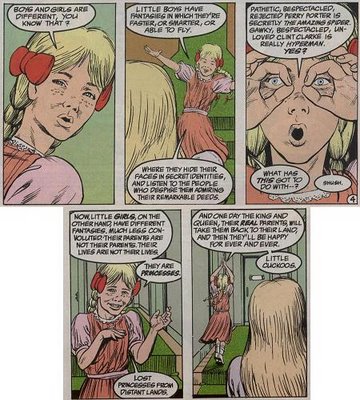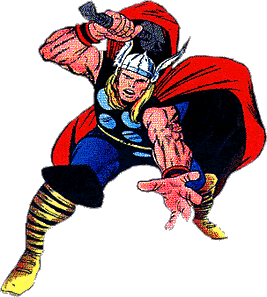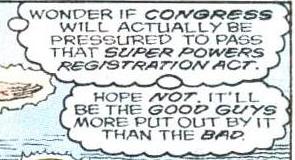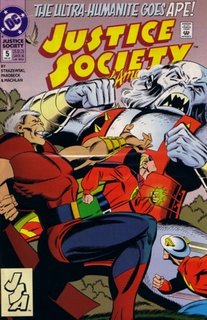It's thoughts like these that keep me up at night.
I was organizing comics the other night, and I came upon a quandary. Does 52 come before or after 1602? 1602 starts with 1, which comes before 5, but 52 comes before 1,602, which is technically the number of the year. Similarly, does JLA come before or after Justice League America? What about Justice League of America? Should I count it as JLA vol. 1 or Justice League (of) America vol. 3 or whatever it is?
It's thoughts like these that keep me up at night.
Which has had more different interpretations, the nature of the Donald Blake/Thor relationship, or the nature of the Anti-Life Equation?
I simply can't imagine what would have given me such an idea, but I started buying Manhunter. I picked up the trade (issues 1-5), got issues 6-9 and 20-22 reserved at my shop, and found 13, 14, 16-19, and 23 at another store. Which leaves 10-12 and 15 yet to be found. And oh, they will be found. No Manhunter escapes this man.
My favorite thing about the series? Reason #4, Dylan Battles.
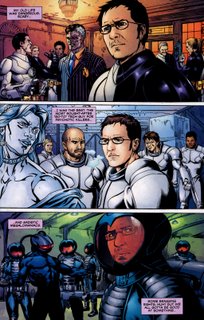
Read Manhunter.
The (walking on, walking on) "broken glass" reference was to an Upright Citizens Brigade skit. I haven't seen many episodes of the show, but what I have seen is brilliant.
My only experience with the comics' Copperhead is from Manhunter and Chase, so I've never seen him in-comic with the outfit he has in the Justice League cartoon. This is too bad, because I really like that costume.
But, this week's 52 has a female Cobra character (according to Stephen Wacker) who sure looks a lot like the animated Copperhead. Seeing that got me to thinking: why is it that, as soon as a male superhero's costume is empty, one of the first thoughts is to put a female character into it? Sure, this Cobra isn't Copperhead, but she looks pretty close, and the trend is everywhere, and it certainly doesn't go both ways. Here's my quick list of the ladies who have raided male heroes' closets.
- Spider-Girl (Ben Reilly's Spider-Man costume)
- Strange Visitor (Superman's electric threads)
- Ms. Marvel II/Sharon Ventura (The Thing's um...body)
- Jesse Quick/The Flash (Shortly during Terminal Velocity, adopting Wally's costume)
- Iris West/Kid Flash (Kingdom Come/The Kingdom/Chain Lightning, Wally West's old costume)
- Dove II (Dove I)
- Hawk II (Hawk I)
- Dr. Fate uh...II? III? (Dr. Fate I/II)
Of course, it's a lot easier to come up with the characters who took a male character's name and altered the costume. Eclipso, Scorpion, Captain Marvel II (Monica Rambeau), Nova (Frankie Raye), etc. Who can I add to the list(s)?
If I ever do a high school movie where they have a big choreographed number during the Prom or other big dance, it's going to be to "Love Shack," grammatical concerns aside. I even know how it's going to go.
Well, the "bang, bang, bang, on the door" part, anyway.
That's it for now. Thoughts? Concerns? Comments?

